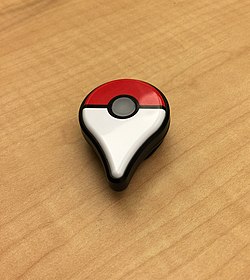Pokémon Go
Pokémon Go (or Pokémon GO) is a free-to-play Android and iOS game. It was developed by Niantic. It is licensed by The Pokemon Company. It was released in July 2016 in the US, Europe, and Australia. The game lets players take prisoner, train and fight machine-based living beings, called Pocket Monsters or Pokémon. The game makes them seem as though they exist in real life by using GPS and a smartphone's camera.
| Pokémon Go | |
|---|---|
| Developer(s) | Niantic |
| Publisher(s) | Niantic |
| Artist(s) | Dennis Hwang |
| Composer(s) | Junichi Masuda |
| Series | Pokémon |
| Engine | Unity |
| Platform(s) | iOS, Android |
| Release |
|
| Genre(s) | Augmented reality |
| Mode(s) | Single-player, multiplayer |
As players walk in the real world, their character in the game moves as well. Players can find Pokemon by using the game map to walk to places where the grass is moving. They can then throw a Pokeball at the Pokemon to see if they can catch it. Players can also walk to special places in the game called "PokeStops" or "Gyms". At PokeStops, players can find extra PokeBalls and candy to feed their Pokemon. At Gyms, players can get their pokemon to fight another pokemon to try to win that gym for their team.
An earlier game by Niantic called Ingress was used to make the special places in the game.[1] Pokemon GO got its start in an April Fool's joke by Google and The Pokemon Company in 2013, called "Pokemon Challenge".[2]
An item called the Pokemon GO Plus is being sold to let people play the game without looking at their smartphones all the time. The Pokemon GO Plus looks like a Poké Ball mixed with the Google Maps pin shape.[3]
Pokémon Go got a score of 68 on Metacritic.[4]
The game became more popular after they released the Generation II Pokémon, featuring more items and stuff. In that update, more berries (a type of fruit that makes the Pokémon easier to catch, more higher chance on not fleeing etc.) were added, and evolution items were added (things that are used to evolve Pokemon to become one certain), such as the Metal Coat and Kings Rock.
Safety Concerns
Many accidents have been reported with people not paying attention to where they are walking or driving. One study completed in 2017 estimated that 100,000 traffic accidents were a direct result of playing the game.[5] People should not play the game while driving or when walking.
References
- ↑ "How Pokémon Go will benefit from Niantic's lessons from Ingress on location-based game design". Retrieved 19 July 2016.
- ↑ Nintendo (15 June 2016). "Pokémon GO - Demonstration - Nintendo E3 2016". Retrieved 19 July 2016 – via YouTube.
- ↑ Frank, Allegra (July 11, 2016). "Pokémon Go Plus: Everything you need to know". Polygon. Vox Media. Archived from the original on July 12, 2016. Retrieved July 12, 2016.
{{cite web}}: Unknown parameter|dead-url=ignored (|url-status=suggested) (help) - ↑ http://www.metacritic.com/game/ios/pokemon-go
- ↑ "Study Estimates That Pokémon GO Has Caused More Than 100,000 Traffic Accidents". Gizmodo. Retrieved 5 August 2018.
Notes
- ↑ Pokémon Go was released on different dates in Europe. It was released in Germany on July 13; the United Kingdom on July 14; Italy, Spain, and Portugal on July 15; and most of the rest of Europe on July 16.

